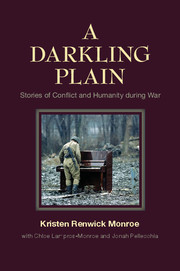Book contents
- Frontmatter
- Epigraph
- Contents
- Preface
- Introduction
- Part one War is a Terrible Thing!
- Part Two Guarding One’s Humanity During War: World War II
- Part Three Other Voices, Other Wars: From Indochina to Iraq
- Part Four Civil Wars and Genocides, Dictators and Domestic Oppressors
- 13 Grandfather Had his Head cut off
- 14 A Resistance to Keep You Alive
- 15 Stuck in the Mud in the Middle of a Civil War
- 16 Too Much was Seen
- 17 Care about other People
- 18 People Suffered Great Loss
- 19 Religion Mixed with Politics Creates Bad Things
- Part Five My Story, Your Choice How to Use it
- Conclusion
- Bibliography
- Acknowledgments by the Senior Author
- Index
14 - A Resistance to Keep You Alive
Ngũgĩ, the Mau Mau, Anti-Colonialism, and Home-grown Dictators
Published online by Cambridge University Press: 05 October 2014
- Frontmatter
- Epigraph
- Contents
- Preface
- Introduction
- Part one War is a Terrible Thing!
- Part Two Guarding One’s Humanity During War: World War II
- Part Three Other Voices, Other Wars: From Indochina to Iraq
- Part Four Civil Wars and Genocides, Dictators and Domestic Oppressors
- 13 Grandfather Had his Head cut off
- 14 A Resistance to Keep You Alive
- 15 Stuck in the Mud in the Middle of a Civil War
- 16 Too Much was Seen
- 17 Care about other People
- 18 People Suffered Great Loss
- 19 Religion Mixed with Politics Creates Bad Things
- Part Five My Story, Your Choice How to Use it
- Conclusion
- Bibliography
- Acknowledgments by the Senior Author
- Index
Summary
The Berlin Conference (1884–85) divided the African continent, making what we think of as Kenya a British colony. After Kenya became its protectorate, the British used “divide and rule” to play off the ethnic groups in the new country, thereby both creating and solidifying perceived differences among various groups and allowing the British to introduce a settler class – akin to the British landed upper middle classes – to establish and export cash crops. British colonists benefited from colonial policies producing unequal legal rights, punitive labor laws, identity cards, and native reserves. To stifle African resentment at this ill treatment, Britain banned all African political groups, allowing only the formation of organizations concerned with “people's welfare.” Disturbed at these injustices, Kenyans staged an uprising from 1952 to 1960. The uprising enjoyed mixed public support and pitted a Gĩkũyũ-dominated anticolonial group (the Mau Mau) against the British Army, auxiliaries, and anti–Mau Mau Gĩkũyũ. The Mau Mau rebellion set fracture points that endured into independence, creating long-standing divisions within the Gĩkũyũ community. In response to demands for independence, the British grudgingly allowed formation of political parties. Two main parties – the Kenya African National Union (KANU) and the Kenya African Democratic Union (KADU) – were established in 1960. Kenya achieved independence in 1964 but remained effectively a one-party state, ruled by the KANU and a Kikuyu-Lui alliance under Jomo Kenyatta from 1963 to 1978. Kenyatta's successor – Daniel Arap Moi – held power until 2002. Pressured by the United States to restore a multi-party system, Moi did so in 1991 but won the elections in 1992 and 1997, with political killings involved on both sides. Moi's involvement in corruption and human rights abuses led to his disbarment from running in the 2002 election, an election won by Mwai Kibaki. Widely reported electoral fraud continues.
Ngũgĩ's life was caught up in the anticolonial fight. His father had multiple wives and the family was divided during the Mau Mau rebellion, with brothers fighting on both sides and Ngũgĩ's mother reportedly tortured at the Kamriithu homeguard post. Ngũgĩ attended schools in Uganda and England, publishing his first novel (1964) in English. His second novel takes the Mau Mau rebellion as its background. Ngũgĩ later renounced English, Christianity, and his given name, arguing that all three reflect colonial repression.
- Type
- Chapter
- Information
- A Darkling PlainStories of Conflict and Humanity during War, pp. 199 - 212Publisher: Cambridge University PressPrint publication year: 2014

